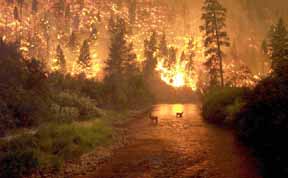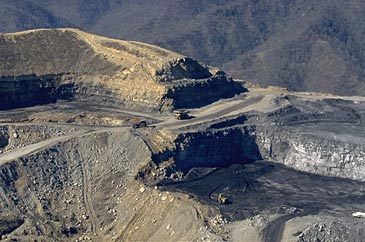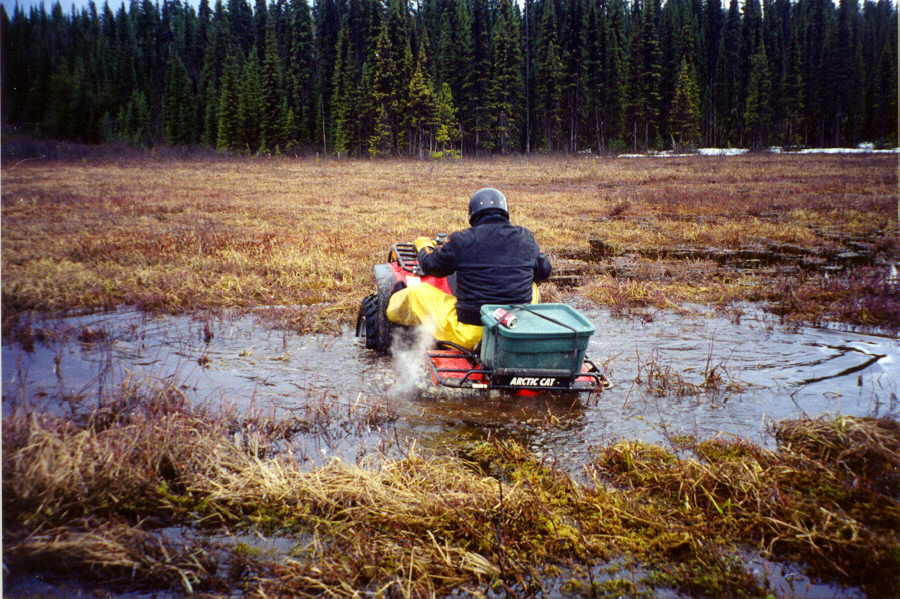
Montana Bitterroot Mountains/August, 2000

Montana Bitterroot Mountains/August, 2000
Phone:
677-5072 (O); 543-7635 (H)
Office:
Philosophy House 103
Office Hours:
M. W 3-4 PM; Th, 1-2 PM
What exactly is nature? Is it the dynamic march of a dizzying array of life forms through the deep reaches of time, a world of tilobites giving way to dinosaurs, even as dinosaurs give way to humans? Or is nature the complexity found in a single ecosystem, where innumerable creatures and elements interact to form a living world? Or is nature the collection of particular living entities, a place where a multitude of beings are given each in its particular value or way of being? Or is nature the life force given from above (or within) that leads ultimately to a G-d or a greater spiritual reality? Or is nature simply the outcome of how our culture categorizes and understands the world in which it inevitably finds itself? Are we part of nature or at odds to it? What is it we encounter when we turn to nature?
And how should we treat nature? Is nature just a valueless thing we humans can use in whatever way we want? Or is nature a complicated machine we need to treat well, if we are to survive? Or is nature a spiritual gift that we have been commanded to respect and nurture? Or is nature an opening into relationships where we find ourselves acting with deference to a variety of living beings, only some of whom are human? Is it the land as a whole that is worthy of our ethical respect or just individual creatures? Do plants matter as much as animals? Have we forgotten to take care of our fellow humans in our rush to help out the grizzly bears and the wolves?
These are among the questions we will touch upon in this course. As the two paragraphs suggest, they can generally be divided in into those having to do with ontology (the study of what something is) and ethics (the study of how we should act in regard to human beings and other living (and possibly non-living) entities).
We will begin our course by reflecting upon our current relationship with the world environing us. In doing so, we will read selections from Terry Tempest William's Refuge to consider how her encounter of her natural surroundings, including the marshes bordering the Great Salt Lake, led to a deeper and truer understanding of her own life and her mother's impending death from cancer. We will also turn to Anthony Weston's Back to Earth to see how it might be that we have become so profoundly disconnected from nature, even as we strive to save the earth from our mistreatment of it. Part of the argument to be made here is that precisely our disconnection from nature, which is in part the outcome of our membership in a highly-adept, supremely-confident, but at time profoundly-destructive technological culture, is a major reason for our neglect of life and living things. In Weston's words, we need to get "back to earth," if we are to become wise enough to save it from ourselves. In reading Williams and Weston we will consider how we might be invited to live more humbly and with greater vulnerability in relationship to both other humans and the more than human world. We will consider whether the earth upon which we tread, the airs in which we breathe, the waters nurturing our bodies, the animals and plants sharing our place under the sun deserve greater attentiveness than we are generally wont to give them. Since there might be many ways in which one can be attentive, we will consider precisely what is meant here by that term.
We will then continue our interrogation of our relationship to a more than human world in an ethical mode by turning to Des Jardins' Environmental Ethics. How should we treat all the other creatures and entities and systems with whom we share our planet? What are some of the particular problems they face due to our treatment of them? How do different ethical approaches, such as biocentsism, holism, deep ecology and social ecology, intend that we resolve the issue of our obligations to the more than human world?
During this time we will keep a journal (the professor too) involving our relationship with one particular niche of our natural surroundings in the Salisbury area, as well as engage in one deed of social activism (whether it be writing a letter, attending a meeting or engaging in a protest) in regard to the earth.
Website for Environmental Issues Minor: Go to Website
Websites Dedicated to Environmental Philosophy:
International
Association for Environmental Philosophy
Center
for Environmental Philosophy
Terry Tempest Williams: Refuge: An Unnatural History of Family and
Place (R)
Anthony Weston: Back to Earth (BE)
Joseph Des Jardins: Environmental Ethics: An Introduction to Environmental
Philosophy (EE)
Reading Questions on Refuge (a).........................05%
Reading Questions on Refuge (b).........................05%
3 Class Presentations (Q/A).................................30%
3 Response Questions..........................................30%
Deed of Ecological Activism.................................10%
Journal.................................................................15%
Participation.........................................................05%
Writing Across the Curriculum Statement: This class emphasizes both discussion and writing as ways of learning. In addition to the assignments listed below, you will be asked to participate in a variety of in-class discussion and writing exercises that will emphasize collaborative and cooperative learning.
ALL CLASSWORK TO BE TURNED IN FOR GRADING IS TO BE TYPED. TO SAVE PAPER YOU MAY SINGLE-SPACE OR USE BOTH SIDES OF THE PAPER.
Class Presentation: Class presentations will be assigned on a weekly basis during the semester. You will be required to have completed three presentations before the end of the semester. A class presentation requires that you prepare to help lead a discussion of the assigned reading. After the discussion you will come up with three questions relevant to its subject for which you will provide thoughtful answers at least a paragraph in length. Being absent when your text is discussed means you receive an F for that assignment.
Response Papers:: Three times during the semester, you will be given a question to respond to for at least two pages. Your response should refer to the texts or lectures in question.

Journal:
You are to write a journal at least fourteen pages long (i.e. a page for
every week of the course). In this journal, you are to report and reflect
upon your research concerning a natural area you have chosen (or been chosen
by) with whom you share your world. The journal should record observations
from your visits to this area that include the animals and plants who make
their home there. You should also do some library research by finding and
reading at least five articles (not web sites!) treating either the habitat
or animals or plants found within your area. Reflective ruminations should
also be a part of your journal. Dreams, poems and visions are welcomed
too. Examples of possible journal entries will be discussed in class. Your
deed of environmental activism could well be based on this journal. You
will be asked to share passages from your journal on selected days of class!

Ecological
Activism: You are to engage in one deed of ecological
activism before the end of the course. You will write up and share with
your fellow classmates an account of your act and any results that came
from it during the time reserved for a final examination. Your act need
not fit any expectations I have concerning what is to be done to save the
environment. In your account you should: a) describe the act, as well as
providing documentation of it (e.g. a copy of a letter, a photograph of
a meeting); b) give the reasons for your act, including documentation that
supports your reasoning; and c) relate any particular practical points
that would help others to engage in a similar act.
1st Week/September 4th, 6th: Damaged Earth
Introduction to Class Requirements; Raising the Issue
of "Damage" Power
Point Presentation
Reading: Chapter 1, Has Environmentalism
Forgotten the Earth? (BE)
2nd Week/September 9th, 11th, 13th: Human Refuge/Natural Refuge: A Case Study
Interview 1 with Terry Tempest Williams Interview 2 with Terry Tempest Williams
Reading: Refuge, pp. ix (Mary Oliver Poem)-65. Photos of Bear River Refuge
9/11 ASSIGNMENT DUE: READING QUESTIONS ON REFUGE Go to Questions
3rd Week/September 17th, 19th, 21st: Letting Ourselves
be Taken Up in the Earth?
Reading: Chapter 4, The Land Sings (BE)
4th Week/September 24th, 26th, 28th: Environmental Damage/Human Damage: A Case Study
Reading: Refuge, pp. 174-290.
TTW on Cancer caused by Atom Testing Letter of Solidarity on Utah Wildlands
9/24 ASSIGNMENT DUE: READING QUESTIONS ON REFUGE go to Questions5th Week/September 30th, October 2nd, 4th: Living with Desolation
Dangers of Off Road Vehicles (ORVs) Using All Terrain Vehicles (ATVs) in the Wilds
Reading: Chapter 5, Desolation (BE)

6th Week/October 7th, 9th (NO CLASS ON 11th!!!): Living Beyond Desolation
Reading: Chapter 6, Coming to our Senses (BE)
7th Week/October 16th, 18th (NO CLASS ON 14th!!!):
The Place of Science in Environmental Studies
Reading: Chapter 1, Science, Ethics and the Environment (EE)
Websites on Hypoxia: Hypoxia Defined Hypoxia in the Gulf of Mexico
10/18 ASSIGNMENT DUE: First Set of Class Presentations (Q/A)8th Week/October 21st, 23rd, 25th: Animal Rights/Animal Liberation
10/18 ASSIGNMENT DUE: 1st Response Paper (Using Williams' Refuge, find examples of and discuss what Weston means by "desolation" and "coming to our senses").
Reading: Chapter 6, Responsibilities to the Natural World: The Case for Animals (EE)
10/23 ASSIGNMENT DUE: First Eight Pages of Journal9th Week/October 28th, 30th, November 1st: The Gaze of Animals
10/23 ASSIGNMENT DUE: One Paragraph as Part of your Journal on Your Developing (or Completed) Deed of Ecological Activism
Reading: Chapter 2, Animals Next to Us (BE)
and Chapter 3, Animals on the Borderline (BE)
10th Week/November 4th, 6th, 8th: Biocentrism as an Ethical Perspective
Reading: Chapter 7, Biocentric Ethics and the Inherent Value of Life (EE)
11/ 8 ASSIGNMENT DUE: 2nd Response Paper (Thinking of a particular animal with whom you have a relationship (this could be your pet, a sparrow in your back yard, a frog you have been assigned to dissect or a chicken someone is serving you for dinner), discuss how Singer, Regan and Weston would respectively characterize that relationship and its moral or social quality. Discuss which approach you would prefer and why? (Or why you prefer none of the approaches!))11/8 ASSIGNMENT DUE: Second Set of Class Presnetations (Q/A)
11th Week/November 11th, 13th, 15th: Wilderness and Restoration
Ecology
Cole's
Mountain
Wilderness
Society
Foreman
and Soule and Wildlands (enter "Foreman,Soule" on the search engine)
The Wildlands
Project
Wilderness
Activist Sites for the Rocky Mountains
Reading: Chapter 8, Ecology Wilderness and Ethics (EE)
12th Week/November 18th, 20th, 22nd: Land as the Good
ASSIGNMENT DUE: Written Rought Draft of "My Deed of Ecological Activism"
13th Week/November 25th, 27th: Sharing Jounral Entries
and Envrionmental Activism
14th Week December 2nd, 4th, 6th: Deep Ecology
Institute
for Deep Ecology
Northwest
Earth Institute
Interview
with Arne Naess
Reading: Chapter 10, Deep Ecology (EE);
Chapter 7 Transhuman Etiquettes (BE)
14th Week/December 9th, 11th, 13th: Ecofeminism and Social Ecology
Links
to Ecofeminism 1
Links
to Ecofeminism 2
Institute
for Social Ecology
Reading: Chapter 11, Social Ecology and Ecofeminism (EE)
12/13 ASSIGNMENT DUE: Final Written Account of "My Deed of Ecological Activism"
12/13 ASSIGNMENT DUE: Third Set of Class Presentations Due
Finals Week
ASSIGNMENT DUE: 3rd Response Paper (Pick one of the five eco-ethical theories we have discussed (deep ecology, holism, ecofeminism, social ecology or biocentrism) in order to evaluate an environmental problem or question you have described in your journal. In making your evaluation, also discuss why you chose this particular theory and what are its strengths or shortcomings.
ASSIGNMENT DUE: Completed Journal of 14+ Pages